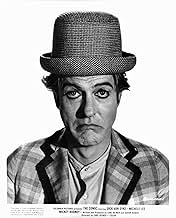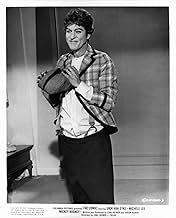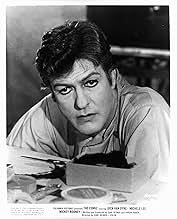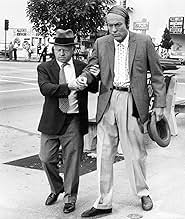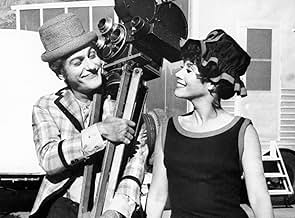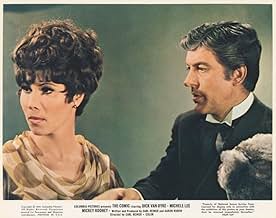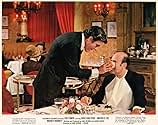Historia de un brillante cómico del cine mudo cuyo talento se ve eclipsado por su ego.Historia de un brillante cómico del cine mudo cuyo talento se ve eclipsado por su ego.Historia de un brillante cómico del cine mudo cuyo talento se ve eclipsado por su ego.
Isabel Sanford
- Woman in Detergent Commercial
- (as Isabell Sanford)
Argumento
¿Sabías que...?
- CuriosidadesWhile starring in El show de Dick Van Dyke (1961), Van Dyke called up Stan Laurel to ask for permission to do a Laurel & Hardy bit in an episode. Laurel told him that neither he nor Hardy's heirs owned the rights to the characters. Van Dyke and Reiner were horrified that Laurel didn't even own the rights to his own face, and this picture is the result.
- PifiasWhen Billy and Cockeye are walking along the Hollywood Walk of Fame, they are on Vine Street near the intersection of Selma Avenue. However, the stars' markers they point out are not in a row, or even near each other at that location.
- Citas
[first lines]
Passerby at Billy's Funeral: Who checked out?
Hearse Driver: An old-time movie actor.
Passerby at Billy's Funeral: What's his name?
Hearse Driver: Billy Bright.
Passerby at Billy's Funeral: Billy Bright? Billy Bright?
Hearse Driver: Yeah, he was... back in the silent movies.
Passerby at Billy's Funeral: Oh, Billy Bright! I thought he was dead?
- ConexionesFeatures The Best Mouse Loses (1920)
- Banda sonoraYes! We Have No Bananas
Written by Frank Silver and Irving Cohn
Performed by Dick Van Dyke
Briefly sung by Billy Bright in voiceover and used as a leitmotif throughout the film
Reseña destacada
Carl Reiner's 1969 film, "The Comic," like Elia Kazan's 1957 movie, "A Face in the Crowd," is a cautionary tale about fame and Hollywood. Both deserved more attention, and truth to tell, some awards (or at least some nominations), and gained notoriety years after their release as fans and film aficionados discovered the works amid new appreciation for earlier eras. "The Comic" is arguably one of the most overlooked films of the inside-Hollywood genre, probably because it came along in a period when the film industry was convulsing into a grittier, more realistic phase (indeed a year when John Wayne in "True Grit" competed against both stars of the X-rated "Midnight Cowboy," with Wayne winning best actor and "Cowboy" winning best picture _ talk about a mixed cinematic metaphor). In "The Comic," a roman a clef which was written, produced and directed by Carl Reiner, Dick Van Dyke plays the fictitious silent film star Billy Bright (the film's initial title was the name) _ a character that in itself has caused some debate as to who it was really based on, with many saying it's a composite of Harry Langdon, Buster Keaton and Stan Laurel, the latter Van Dyke's hero and friend. Others also have seen shades of Harold Lloyd. Having interviewed Van Dyke some years later when he spoke fondly of Laurel and how they met, describing how he delivered the eulogy at Laurel's funeral, and how anxious he was to discover the whereabouts of the comedian's famed bowler hat that he said he had been promised but never received (I was pretty sure I knew the guy who had it and shared the information), I find it difficult to believe he would have based the character on someone about whom he cared so deeply. At any rate, as a denizen of Hollywood and a fan of the silents who grew up at a time when many of the old comics were still around and re-emerging, I can say without hesitation that Van Dyke got it right and hit a home run in what is perhaps the best work of his career (Van Dyke doesn't get enough credit for the fine work he did in films, largely because he came along at a time when the division between TV and film was great and the film people still looked down upon their TV counterparts, and again, film was in the midst of a great transition). Reiner (known to later generations as Rob Reiner's Dad, but to many of us as the brilliant second banana on Sid Caesar's early-TV "Show of Shows" and one half of the 2000-year-old man comedy team with his friend Mel Brooks) constructs the film beautifully from the opening sequence at Billy's funeral. The latter, an absolute hoot, contains an overhead shot of cars driving on the way to the burial plot that will have you struggling to keep a straight face at every funeral you attend from here on out, and while that isn't a humorous thing, it demonstrates the power and the rightness of the moment. One of the more fascinating elements of the film is a Hollywood story-within-a-story, how Carl Reiner's pacing and sense of comedic irony laced with sadness and the sense of smiling through the tears influenced his own son Rob's acting and directing style. Now there's a subject for a future film. "The Comic" is a keeper and deserves to be seen and more widely discussed, if only to shed more attention on the silent era lest it be forgotten in a time of pyrotechnic overkill.
- kckidjoseph-1
- 11 jul 2014
- Enlace permanente
Selecciones populares
Inicia sesión para calificar y añadir a tu lista para recibir recomendaciones personalizadas
- How long is The Comic?Con tecnología de Alexa
Detalles
- Duración1 hora 34 minutos
- Mezcla de sonido
- Relación de aspecto
- 1.85 : 1
Contribuir a esta página
Sugerir un cambio o añadir el contenido que falta

Principal laguna de datos
By what name was El cómico (1969) officially released in India in English?
Responde
